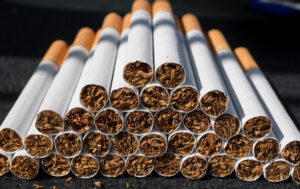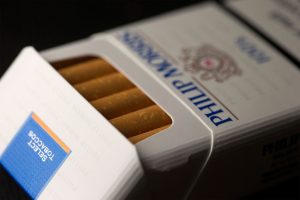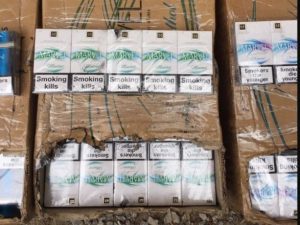
Philip Morris International (PMI) tobacco concern in the second quarter of 2023 increased shipments of cigarettes and tobacco sticks in the Ukrainian market by 50.3% compared to the same period last year, while in the first quarter there was a decline of 26.7%, according to the quarterly report of PMI.
According to it, the market in Ukraine as a whole grew by 13.4% in the second quarter of this year, thus the company managed to increase its share in the Ukrainian market after a slump last year.
More detailed information on sales in Ukraine is not available in the document, but it is indicated that PMI in July began preparatory work on a new facility in Lviv region in western Ukraine, which will be invested $30 million and production is scheduled to start in the first quarter of 2024.
It is specified that the Kharkiv plant, which was shut down at the end of February 2022, remains in the same condition due to existing threats, while products are supplied to the Ukrainian market from production centers outside Ukraine, as well as through contract manufacturing.
In the first half of the year PMI additionally did not adjust the value of its long-term assets in Ukraine, unlike last year.
It is stated that as of June 30, 2023, total assets of PMI’s Ukrainian operations were approximately $497 million, compared to $485 million a quarter earlier. These assets included receivables, inventories, and fixed assets of $75 million ($69 million), $305 million ($324 million), and $29 million ($30 million), respectively.
In addition, Lviv Regional Military Administration reported a July 27 meeting between its chief, Maksym Kozitsky, and PMI’s vice president for Northeast Europe, Michal Mierzejewski, where future production was discussed.
“The company has received a license to produce tobacco products in Lvivshchyna for five years with the possibility of extending it in the future. I hope that the plant, having created jobs, will provide the residents of our region with work,” – said the head of Lviv OVA.
In turn, Mierzejewski confirmed plans to launch production in the first quarter of 2024 and create more than 250 jobs at the new factory.
“First of all, we will employ employees of our Kharkiv factory, but we will also hire local specialists, which will create new jobs for residents of the region who have experience or would like to get it to work in this field,” – said the vice-president of PMI.
As reported, Philip Morris International in 2022 reduced shipments in the Ukrainian market by 30.1% – to 11.07 billion cigarettes and tobacco sticks. In particular, sales of cigarettes decreased by 38.1% to 6.6 billion, tobacco sticks for tobacco heating systems – by 13.5% to 4.47 billion.

The findings of the Supreme Court, which allowed Tedis Ukraine to satisfy the cassation appeal against the Antimonopoly Committee of Ukraine (AMCU) and invalidate the fine of UAH 3.4 billion, will also significantly enhance the prospects of cigarette manufacturers to revoke the decision of the committee on fines, according to lawyers interviewed by Interfax-Ukraine.
“Speaking of other tobacco trials, it should be said that the Supreme Court’s findings on the inconsistency of the Antimonopoly Committee’s decision with the rules of prejudice and evidence can significantly enhance the prospects of cigarette manufacturers to overturn the Antimonopoly Committee’s decision,” Asters law firm partner Oleksiy Pustovit said.
He recalled that the Supreme Court had put an end to the Tedis Ukraine lawsuit against the Antimonopoly Committee, invalidating the committee’s decision incriminating anti-competitive concerted actions by Tedis and cigarette manufacturers Philip Morris International (PMI), JT International (JTI), Imperial Tobacco (IT) and British American Tobacco (BAT).
“The decision is important both in terms of influencing the law enforcement practice of the Antimonopoly Committee as a whole and in terms of changing the balance of power in ongoing similar litigation between cigarette manufacturers and the committee,” he said.
The lawyer called the Supreme Court’s decision “brief and capacious at the same time.” In particular, according to the lawyer, the most remarkable position is the illegality of the committee’s use of its decisions and recommendations in other cases as adjudicated. Many of the committee’s findings were not established or examined on the basis of evidence, as required by law, but were taken from other cases in which participants, markets and circumstances differed. In addition, the committee’s decision also contained elements of letters of recommendation as evidence in the case, which was closed without establishing any facts of violation of competition law.
“The Supreme Court concluded that the Antimonopoly Committee, citing other decisions, did not in fact investigate the market itself, which is decisive for any antitrust case, while other decisions dealt with other markets. The issue of the illegality of the committee’s use of its decisions in other cases as adjudicated was raised by the manufacturers and Tedis at the stage of consideration of the case by the committee. From a legal point of view, such an approach is tantamount to charges without some hard evidence,” he said.
The lawyer said that similar arguments were used in the claims of the tobacco manufacturers.
“Following the decision of the Supreme Court, courts will most likely follow the position of the illegality of the committee’s decisions and recommendations made in other cases as adjudicated, in other cases under manufacturer’s claims, which enhances the manufacturer’s chances of winning disputes with the committee,” Pustovit said.
In turn, partner of the Legal Alliance Andriy Gorbatenko reminded that the Antimonopoly Committee imposed a fine on tobacco companies due to the fact that with the entry of Tedis Ukraine (formerly Megapolis-Ukraine) in 2010, the number of cigarette distributors began to decline sharply and by 2013 Tedis Ukraine was the only distributor to which cigarette manufacturers supplied their products. Following the investigation, the committee concluded that this circumstance was the result of anti-competitive concerted actions that concerned the elimination of other distributors from the market or restriction of market access to them. In particular, the Antimonopoly Committee found that cigarette manufacturers had identified unfeasible selection conditions for distributors, which even Tedis Ukraine did not meet.
However, the lawyer said that “the unfortunate decision of the Antimonopoly Committee does not contain exhaustive evidence that would unequivocally answer this question,” and the Antimonopoly Committee did not provide evidence of consistency between the actions of cigarette manufacturers and Tedis Ukraine.
“Could this decision of the Supreme Court be the basis for reversing the decision of the Antimonopoly Committee and some cigarette manufacturers? Definitely, yes. Given the position set out in the decision of the Supreme Court, the accusation of the Antimonopoly Committee in this case is as follows: there seemed to be some agreement to establish barriers for other distributors to enter the primary cigarettes market, but it is not clear who agreed on this and with whom and it does not mean that the conditions established as a result of such an agreement (if any) could really create a barrier,” the lawyer said.
Gorbatenko also said that “the rest of the charges are based on evidence that cannot be used because it was collected in other investigations.”
“The probability that the Antimonopoly Committee’s decision regarding the accusations against the manufacturers will be backed by courts is akin to the probability of meeting an alien mind. Of course, there is a chance, but everyone will be very surprised if it really happens,” the lawyer said.
“We just have to hope that this decision of the Supreme Court will not only bring disappointment to the Antimonopoly Committee, but will also be an incentive for more thorough investigations and preparation of decisions, possibly in relation to Tedis Ukraine,” Gorbatenko said.
In turn, the American Chamber of Commerce in Ukraine reminded that “the rule of law and fair justice is one of the strategic priorities identified by the American Chamber of Commerce in 10 steps for Ukraine’s economic recovery and growth in 2021.”
The Chamber, in particular, notes the need for transparent and fair litigation, as companies have expressed concern that they have not been given full access to the evidence on which the Antimonopoly Committee’s allegations are based, and that insufficient attention was paid the companies’ arguments during the trial.
“Such high-profile disputes usually attract a lot of attention from the international community and can have an extremely negative impact on Ukraine’s image among foreign investors. A quick, transparent and fair solution will help maintain business relations between strategic investors and the state, not damage Ukraine’s reputation and investment climate and avoid losses for the budget,” President of the American Chamber of Commerce in Ukraine Andy Hunder said.

Philip Morris International Inc. (PMI) in January-September 2020 cut cigarette shipment volume by 4.8%, mainly due to the lower total market, partly offset by a higher market share, driven by heated tobacco units.
According to a quarterly report published by PMI, the total market in Ukraine was down by 9.7%, mainly reflecting the impact of excise tax-driven price increases, as well as reduced adult smoker average daily consumption, notably in the second quarter of 2020, due to lockdown measures.
The company said that in Q3 2020 the total market in Ukraine fell by 7.4%.

The share of the illegal cigarette market in Ukraine as of August 2020 increased to 6.9% compared to 6.6% in 2019, CEO of the tobacco company JTI Ukraine Paul Holloway has said, citing a Kantar study.
“This means that in the first eight months of this year, the national budget received UAH 4.5 billion less,” he said at a press conference at Interfax-Ukraine on Wednesday.
According to Kantar data, over the entire past year, the share of illegal trade in tobacco products in Ukraine was 6.6%, or 3.5 billion cigarettes. As a result, the national budget received UAH 4.7 billion less.
At the same time, in July 2020, Kantar estimated the volume of the illegal cigarette market in Ukraine at 5%.
As Holloway said, consumers spend about 25% of their income on cigarettes. Consequently, an increase in the price of cigarettes will lead to an increase in the illicit trade in cigarettes.
The CEO of JTI Ukraine said that legal business is losing market share in favor of illegal manufacturers and smugglers. Moreover, 75-80% of the cost of legal cigarettes are taxes, which the manufacturers of illegal cigarettes do not pay.
To fight the illegal tobacco market, the company launched the No Smuggling project, he said.
Acting Head of the State Fiscal Service (SFS) Serhiy Solodchenko said that in the first nine months of 2020, his service seized excisable goods for the amount of UAH 2.034 billion, of which about 36% in monetary terms were tobacco products.
During this period, the tax police seized 11.5 million packages of tobacco products and 164 tonnes of tobacco from illegal circulation for the amount of UAH 730.4 million. In monetary terms, this is almost twice more compared to the same period last year.

The share of Tedis Ukraine in the cigarette distribution market in 2019 was less than 75% against 99% in 2013-2015, Olha Pischanska, the head of the Antimonopoly Committee of Ukraine (AMC), has said.
“According to our data, during 2018-2019, the share of Tedis in the cigarette distribution market decreased by some percentage. So, if during 2013-2015 it was 99%, then according to the results of 2019 it did not reach 75%. If to talk about specific figures for today, it is necessary to conduct a separate study,” she said in an interview with the Interfax-Ukraine agency.
Pischanska said that in addition to Tedis, other companies buy cigarettes from manufacturers, which did not happen at the time of the AMC’s decision in 2016.
“In order to demonopolize the market, at the end of 2019, recommendations of the AMC were provided to the largest manufacturers of tobacco products, and a working group was created on the basis of the Ministry of Economy, in which we take part,” she noted.
Pischanska also said that the AMC, in response to statements by tobacco companies about the possibility of filing a claim in international arbitration, created a working group and assesses the risks of the arbitration process.
In addition, asked about the position of the committee on the implementation of the pilot project National Tobacco Operator, Pischanska noted that the AMC does not yet have an official text of this document.
“Since today we do not have an official text of this document, the AMC is not able to form a position on the compliance of the project with competition legislation,” she said, adding that any model has the right to exist if it acts in accordance with the law.

Ukraine produced 51 billion cigarettes in 2019, which is 15% less than in 2018, Country General Manager of Imperial Tobacco in Ukraine Rastislav Cernak has said.
“Compared to European countries, the decline in the volume of the cigarette market was indeed proceeding rapidly. According to our data, the market dropped by 15% compared to the previous year. In 2011-2017, the decline was less than what we observed in 2019,” he said in an interview with Interfax-Ukraine.
There are several objective reasons for the fall of the Ukrainian market, according to Cernak, including an increase in excise duty.
“In 2018, the excise tax on cigarettes increased 30%, in 2019 we had two increases – in January by 20%, and in July, by an additional 9%. A significant increase in excise tax led to an increase in the price of a pack of cigarettes, which caused growth in illegal trade,” he said.
The general manager of Imperial Tobacco in Ukraine said that over the past few years, the level of illegal trade has doubled. According to TNS Kantar research, in 2019, the level of illegal trade reached 7%. The upward trend has been observed since 2017.